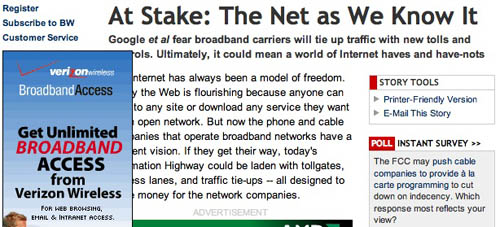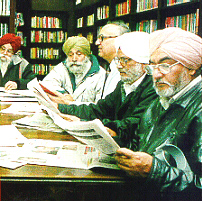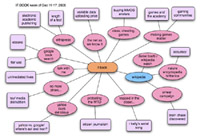the institute is a bit over a year old now. our understanding of what we’re doing has deepened considerably during the year, so we thought it was time for a serious re-statement of our goals. here’s a draft for a new mission statement. we’re confident that your input can make it better, so please send your ideas and criticisms.
OVERVIEW
The Institute for the Future of the Book is a project of the Annenberg Center for Communication at USC. Starting with the assumption that the locus of intellectual discourse is shifting from printed page to networked screen, the primary goal of the Institute is to explore, understand and hopefully influence this evolution.
THE BOOK
We use the word “book” metaphorically. For the past several hundred years, humans have used print to move big ideas across time and space for the purpose of carrying on conversations about important subjects. Radio, movies, TV emerged in the last century and now with the advent of computers we are combining media to forge new forms of expression. For now, we use “book” to convey the past, the present transformation, and a number of possible futures.
THE WORK & THE NETWORK
One major consequence of the shift to digital is the addition of graphical, audio, and video elements to the written word. More profound, however, are the consequences of the relocation of the book within the network. We are transforming books from bounded objects to documents that evolve over time, bringing about fundamental changes in our concepts of reading and writing, as well as the role of author and reader.
SHORT TERM/LONG TERM
The Institute values theory and practice equally. Part of our work involves doing what we can with the tools at hand (short term). Examples include last year’s Gates Memory Project or the new author’s thinking-out-loud blogging effort. Part of our work involves trying to build new tools and effecting industry wide change (medium term): see the Sophie Project and NextText. And a significant part of our work involves blue-sky thinking about what might be possible someday, somehow (long term). Our blog, if:book covers the full-range of our interests.
CREATING TOOLS
As part of the Mellon Foundation’s project to develop an open-source digital infrastructure for higher education, the Institute is building Sophie, a set of high-end tools for writing and reading rich media electronic documents. Our goal is to enable anyone to assemble complex, elegant, and robust documents without the necessity of mastering overly complicated applications or the help of programmers.
NEW FORMS, NEW PROCESSES
Academic institutes arose in the age of print, which informed the structure and rhythm of their work. The Institute for the Future of the Book was born in the digital era, and we seek to conduct our work in ways appropriate to the emerging modes of communication and rhythms of the networked world. Freed from the traditional print publishing cycles and hierarchies of authority, the Institute seeks to conduct its activities as much as possible in the open and in real time.
HUMANISM & TECHNOLOGY
Although we are excited about the potential of digital technologies to amplify human potential in wondrous ways, we believe it is crucial to consciously consider the social impact of the long-term changes to society afforded by new technologies.
BEYOND BORDERS
Although the institute is based in the U.S. we take the seriously the potential of the internet and digital media to transcend borders. We think it’s important to pay attention to developments all over the world, recognizing that the future of the book will likely be determined as much by Beijing, Buenos Aires, Cairo, Mumbai and Accra as by New York and Los Angeles.
Category Archives: internet
another view on the stacey/gamma flap
For an alternative view of Lisa’s earlier post … i wonder if Gamma’s submission of Adam Stacey’s image with the “Adam Stacey/Gamma” attribution doesn’t show the strength of the Creative Commons concept. As i see it, Stacey published his image without any restrictions beyond attribution. Gamma, a well-respected photo agency started distributing the image attributed to Stacey. Isn’t this exactly what the CC license was supposed to enable — the free-flow of information on the net. perhaps Stacey chose the wrong license and he didn’t mean for his work to be distributed by a for-profit company. If so, that is a reminder to all of us to be careful about which Creative Commons license we choose. One thing i’m not clear on is whether Gamma referenced the CC license. They are supposed to do that and if they didn’t they should have.
last week: wikipedia, r kelly, gaming and google panels, and more…
Here’s an overview of what we’ve been posting over the last week. As well, a few of us having been talking about ways to graphically represent text, so I thought I would include a mind map of this overview.
As a follow up to the increasingly controversial wikipedia front, Daniel Brandt uncovered that Brian Chase posted false information about John Seignthaler that was reported here last week. To add fuel to the fire, Nature weighed in that Encyclopedia Britannica may not be as reliable as Wikipedia.
Business Week noted a possible future of pricing for data transfer. Currently, carries such as phone and cable companies are developing technology to identify and control what types of media (voice, images, text or video) are being uploaded. This ability opens the door to being able to charge for different uses of data transfer, which would have a huge impact on uploading content for personal creative use of the internet.
Liz Barry and Bill Wetzel shared some of their experiences from their “Talk to Me” Project. With their “talk to me” sign in tow, they travel around New York and the rest of the US looking for conversation. We were impressed at how they do not have a specific agenda besides talking to people. In the mediated age, they are not motivated by external political/ religious/ documentary intentions. What they do document is available on their website, and we look forward to see what they come up with next.
The Google Book Search debate continues as well, via a panel discussion hosted by the American Bar Association. Interestingly, publishers spoke as if the wide scale use of ebooks is imminent. More importantly and even if this particular case settles out of court, the courts have a pressing need to define copyright and fair use guidelines for these emerging uses.
With the protest of the WTO meetings in Hong Kong this past week, new journalism forms took one step forward. The website Curbside @ WTO covered the meetings with submissions from journalism students, bloggers and professional journalists.
McDonalds filed a patent which suggests that it intends to offer clips of movies instead of the traditional toys in their kids oriented Happy Meals. Lisa pondered if a video clip can successfully replace a toy, and if it does, what the effects on children’s imaginations might be.
R. Kelly’s experiments in form and the “serial song” through his Trapped in the Closet recordings. While R Kelly has varying success in this endeavor, Dan compared the experience of not only the serial novel, but also Julie Powell’s foray into transferring her blog into book form and what she might have learned from R. Kelly (its hard to make unified pieces maintain an overall coherency.)
The world of academic publishing was challenged with a proposal calling to create an electronic academic press. This segment seems especially ripe for the shift to digital publishing as many journals with small circulations face raising printing and production costs.
Sol and others from the institute attended “Making Games Matter,” a panel with contributors from The Game Design Reader: A Rules of Play Anthology, edited by Katie Salen and Eric Zimmerman. The discussion covered among other things: involving the academy in creating a discourse for gaming and game design, obstacles in studying and creating games, and the game “industry” itself. The book and panel called out for games and gaming to undergo a formal study akin to the novel and the experience of reading. Also, in the gaming world, the class economics of the real and virtual began to emerge as a Chinese firm pays employees to build up characters in MMOGs to sell to affluent gamers.
the net as we know it
There’s a good article in Business Week describing the threat posed by unregulated phone and cable companies to the freedom and neutrality of the internet. The net we know now favors top-down and bottom-up publishing equally. Yahoo! or The New York Times may have more technical resources at their disposal than your average blogger, but in the pipes that run in and out of your home connecting you to the net, they are equals.
That could change, however. Unless government gets pro-active on the behalf of ordinary users, broadband providers will be free to privilege certain kinds of use and certain kinds of users, creating the conditions for a broadcast-oriented web and charging higher premiums for more independently creative uses of bandwidth.
Here’s how it might work:
So the network operators figure they can charge at the source of the traffic — and they’re turning to technology for help. Sandvine and other companies, including Cisco Systems, are making tools that can identify whether users are sending video, e-mail, or phone calls. This gear could give network operators the ability to speed up or slow down certain uses.
That capability could be used to help Internet surfers. BellSouth, for one, wants to guarantee that an Internet-TV viewer doesn’t experience annoying millisecond delays during the Super Bowl because his teenage daughter is downloading music files in another room.
But express lanes for certain bits could give network providers a chance to shunt other services into the slow lane, unless they pay up. A phone company could tell Google or another independent Web service that it must pay extra to ensure speedy, reliable service.
One commenter suggests a rather unsavory scheme:
The best solution is to have ISPs change monthly billing to mirror cell phone bills: X amount of monthly bandwidth any overage customer would be charged accordingly. File sharing could become legit, as monies from our monthly bills could be funneled to the apprioprate copyright holder (big media to regular Joe making music in his room) and the network operators will be making more dough on their investment. With the Skypes of the world I can’t see this not happenning!

It seems appropriate that when I initially tried to read this article, a glitchy web ad was blocking part of the text — an ad for broadband access no less. Bastards.
the role of note taking in the information age
An article by Ann Blair in a recent issue of Critical Inquiry (vol 31 no 1) discusses the changing conceptions of the function of note-taking from about the sixth century to the present, and ends with a speculation on the way that textual searches (such as Google Book Search) might change practices of note-taking in the twenty-first century. Blair argues that “one of the most significant shifts in the history of note taking” occured in the beginning of the twentieth century, when the use of notes as memorization aids gave way to the use of notes as a aid to replace the memorization of too-abundant information. With the advent of the net, she notes:
Today we delegate to sources that we consider authoritative the extraction of information on all but a few carefully specialized areas in which we cultivate direct experience and original research. New technologies increasingly enable us to delegate more tasks of remembering to the computer, in that shifting division of labor between human and thing. We have thus mechanized many research tasks. It is possible that further changes would affect even the existence of note taking. At a theoretical extreme, for example, if every text one wanted were constantly available for searching anew, perhaps the note itself, the selection made for later reuse, might play a less prominent role.
The result of this externalization, Blair notes, is that we come to think of long-term memory as something that is stored elsewhere, in “media outside the mind.” At the same time, she writes, “notes must be rememorated or absorbed in the short-term memory at least enough to be intelligently integrated into an argument; judgment can only be applied to experiences that are present to the mind.”
Blair’s article doesn’t say that this bifurcation between short-term and long-term memory is a problem: she simply observes it as a phenomenon. But there’s a resonance between Blair’s article and Naomi Baron’s recent Los Angeles Times piece on Google Book Search: both point to the fact that what we commonly have defined as scholarly reflection has increasingly become more and more a process of database management. Baron seems to see reflection and database management as being in tension, though I’m not completely convinced by her argument. Blair, less apocalyptic than Baron, nonetheless gives me something to ponder. What happens to us if (or when) all of our efforts to make the contents of our extrasomatic memory “present to our mind” happen without the mediation of notes? Blair’s piece focuses on the epistemology rather than the phenomenology of note taking — still, she leads me to wonder what happens if the mediating function of the note is lost, when the triangular relation between book, scholar and note becomes a relation between database and user.
insidious tactic #348: charge for web speed
An article in yesterday’s Washington Post — “Executive Wants to Charge for Web Speed” — brings us back to the question of pipes and the future of the internet.  The chief technology officer for Bell South says telecoms and cable companies ought to be allowed to offer priority deals to individual sites, charging them extra for faster connections. The Post:
The chief technology officer for Bell South says telecoms and cable companies ought to be allowed to offer priority deals to individual sites, charging them extra for faster connections. The Post:
Several big technology firms and public interest groups say that approach would enshrine Internet access providers as online toll booths, favoring certain content and shutting out small companies trying to compete with their offerings.
Among these “big technology firms” are Google, Yahoo!, Amazon and eBay, all of whom have pressed the FCC for strong “network neutrality” provisions in the latest round of updates to the 1996 Telecommunications Act. These would forbid discrimination by internet providers against certain kinds of content and services (i.e. the little guys). BellSouth claims to support the provisions, though the statements of its tech officer suggest otherwise.
Turning speed into a bargaining chip will undoubtedly privilege the richer, more powerful companies and stifle competition — hardly a net-neutral scenario. They claim it’s no different from an airline offering business class — it doesn’t prevent folks from riding coach and reaching their destination. But we all know how cramped and awful coach is. The truth is that the service providers discriminate against everyone on the web. We’re all just freeloaders leeching off their pipes. The only thing that separates Google from the lady blogging about her cat is how much money they can potentially pay for pipe rental. That’s where the “priorities” come in.
Moreover, the web is on its way to merging with cable television, and this, in turn, will increase the demand for faster connections that can handle heavy traffic. So “priority” status with the broadband providers will come at an ever increasing premium. That’s their ideal business model, allowing them to charge the highest tolls for the use of their infrastructure. That’s why the telecos and cablecos want to ensure, through speed-baiting and other screw-tightening tactics, that the net transforms from a messy democratic commons into a streamlined broadcast medium. Alternative media, video blogging, local video artists? These will not be “priorities” in the new internet. Maximum profit for pipe-holders will mean minimum diversity and a one-way web for us.
In a Business Week interview last month, SBC Telecommunications CEO Edward Whitacre expressed what seemed almost like a lust for revenge. Asked, “How concerned are you about Internet upstarts like Google, MSN, Vonage, and others?” he replied:
How do you think they’re going to get to customers? Through a broadband pipe. Cable companies have them. We have them. Now what they would like to do is use my pipes free, but I ain’t going to let them do that because we have spent this capital and we have to have a return on it. So there’s going to have to be some mechanism for these people who use these pipes to pay for the portion they’re using. Why should they be allowed to use my pipes?
The Internet can’t be free in that sense, because we and the cable companies have made an investment and for a Google or Yahoo! or Vonage or anybody to expect to use these pipes [for] free is nuts!
This makes me worry that discussions about “network neutrality” overlook a more fundamental problem: lack of competition. “That’s the voice of someone who doesn’t think he has any competitors,” says Susan Crawford, a cyberlaw and intellectual property professor at Cardozo Law School who blogs eloquently on these issues. She believes the strategy to promote network neutrality will ultimately fail because it accepts a status quo in which a handful of broadband monopolies dominate the market. “We need to find higher ground,” she says.
I think the real fight should be over rights of way and platform competition. There’s a clear lack of competition in the last mile — that’s where choice has to exist, and it doesn’t now. Even the FCC’s own figures reveal that cable modem and DSL providers are responsible for 98% of broadband access in the U.S., and two doesn’t make a pool. If the FCC is getting in the way of cross-platform competition, we need to fix that. In a sense, we need to look down — at the relationship between the provider and the customer — rather than up at the relationship between the provider and the bits it agrees to carry or block…
…Competition in the market for pipes has to be the issue to focus on, not the neutrality of those pipes once they have been installed. We’ll always lose when our argument sounds like asking a regulator to shape the business model of particular companies.
The broadband monopolies have their priorities figured out. Do we?
image: “explosion” (reminded me of fiber optic cable) by The Baboon, via Flickr
katrina archive on internet archive
The Internet Archive has just established an archive dedicated to preserving the online response to the Katrina catastrophe. According to the Archive:
The Internet Archive and many individual contributors worked together to put together a comprehensive list of websites to create a historical record of the devastation caused by Hurricane Katrina and the massive relief effort which followed. This collection has over 25 million unique pages, all text searchable, from over 1500 sites. The web archive commenced on September 4th.
If you try to link to the Internet Archive today, you might not get through, because everyone is on the site talking about the Grateful Dead’s decision to allow free downloading
flushing the net down the tubes
Grand theories about upheavals on the internet horizon are in ready supply. Singularities are near. Explosions can be expected in the next six to eight months. Or the whole thing might just get “flushed” down the tubes. This last scenario is described at length in a recent essay in Linux Journal by Doc Searls, which predicts the imminent hijacking of the net by phone and cable companies who will turn it into a top-down, one-way broadcast medium. In other words, the net’s utopian moment, the “read/write” web, may be about to end. Reading Searls’ piece, I couldn’t help thinking about the story of radio and a wonderful essay Brecht wrote on the subject in 1932:

Here is a positive suggestion: change this apparatus over from distribution to communication. The radio would be the finest possible communication apparatus in public life, a vast network of pipes. That is to say, it would be if it knew how to receive as well as to transmit, how to let the listener speak as well as hear, how to bring him into a relationship instead of isolating him. On this principle the radio should step out of the supply business and organize its listeners as suppliers….turning the audience not only into pupils but into teachers.
Unless you’re the military, law enforcement, or a short-wave hobbyist, two-way radio never happened. On the mainstream commercial front, radio has always been about broadcast: a one-way funnel. The big FM tower to the many receivers, “prettifying public life,” as Brecht puts it. Radio as an agitation? As an invitation to a debate, rousing families from the dinner table into a critical encounter with their world? Well, that would have been neat.
Now there’s the internet, a two-way, every-which-way medium — a stage of stages — that would have positively staggered a provocateur like Brecht. But although the net may be a virtual place, it’s built on some pretty actual stuff. Copper wire, fiber optic cable, trunks, routers, packets — “the vast network of pipes.” The pipes are owned by the phone and cable companies — the broadband providers — and these guys expect a big return (far bigger than they’re getting now) on the billions they’ve invested in laying down the plumbing. Searls:
The choke points are in the pipes, the permission is coming from the lawmakers and regulators, and the choking will be done….The carriers are going to lobby for the laws and regulations they need, and they’re going to do the deals they need to do. The new system will be theirs, not ours….The new carrier-based Net will work in the same asymmetrical few-to-many, top-down pyramidal way made familiar by TV, radio, newspapers, books, magazines and other Industrial Age media now being sucked into Information Age pipes. Movement still will go from producers to consumers, just like it always did.
If Brecht were around today I’m sure he would have already written (or blogged) to this effect, no doubt reciting the sad fate of radio as a cautionary tale. Watch the pipes, he would say. If companies talk about “broad” as in “broadband,” make sure they’re talking about both ends of the pipe. The way broadband works today, the pipe running into your house dwarfs the one running out. That means more download and less upload, and it’s paving the way for a content delivery platform every bit as powerful as cable on an infinitely broader band. Data storage, domain hosting — anything you put up there — will be increasingly costly, though there will likely remain plenty of chat space and web mail provided for free, anything that allows consumers to fire their enthusiasm for commodities through the synapse chain.
 If the net goes the way of radio, that will be the difference (allow me to indulge in a little dystopia). Imagine a classic Philco cathedral radio but with a few little funnel-ended hoses extending from the side that connect you to other listeners. “Tune into this frequency!” “You gotta hear this!” You whisper recommendations through the tube. It’s sending a link. Viral marketing. Yes, the net will remain two-way to the extent that it helps fuel the market. Web browsers, like the old Philco, would essentially be receivers, enabling participation only to the extent that it encouraged others to receive.
If the net goes the way of radio, that will be the difference (allow me to indulge in a little dystopia). Imagine a classic Philco cathedral radio but with a few little funnel-ended hoses extending from the side that connect you to other listeners. “Tune into this frequency!” “You gotta hear this!” You whisper recommendations through the tube. It’s sending a link. Viral marketing. Yes, the net will remain two-way to the extent that it helps fuel the market. Web browsers, like the old Philco, would essentially be receivers, enabling participation only to the extent that it encouraged others to receive.
You might even get your blog hosted for free if you promote products — a sports shoe with gelatinous heels or a music video that allows you to undress the dancing girls with your mouse. Throw in some political rants in between to blow off some steam, no problem. That’s entrepreneurial consumerism. Make a living out of your appetites and your ability to make them infectious. Hip recommenders can build a cosy little livelihood out of their endorsements. But any non-consumer activity will be more like amateur short-wave radio: a mildly eccentric (and expensive) hobby (and they’ll even make a saccharine movie about a guy communing with his dead firefighter dad through a ghost blog).
Searls sees it as above all a war of language and metaphor. The phone and cable companies will dominate as long as the internet is understood fundamentally as a network of pipes, a kind of information transport system. This places the carriers at the top of the hierarchy — the highway authority setting the rules of the road and collecting the tolls. So far the carriers have managed, through various regulatory wrangling and court rulings, to ensure that the “transport metaphor” has prevailed.
But obviously the net is much more than the sum of its pipes. It’s a public square. It’s a community center. It’s a market. And it’s the biggest publishing system the world has ever known. Searls wants to promote “place metaphors” like these. Sure, unless you’re a lobbyist for Verizon or SBC, you probably already think of it this way. But in the end it’s the lobbyists that will make all the difference. Unless, that is, an enlightened citizens’ lobby begins making some noise. So a broad, broad as in broadband, public conversation should be in order. Far broader than what goes on in the usual progressive online feedback loops — the Linux and open source communities, the creative commies, and the techno-hip blogosphere, that I’m sure are already in agreement about this.
Google also seems to have an eye on the pipes, reportedly having bought thousands of miles of “dark fiber” — pipe that has been laid but is not yet in use. Some predict a nationwide “Googlenet.” But this can of worms is best saved for another post.
virtual libraries, real ones, empires
 Last Tuesday, a Washington Post editorial written by Library of Congress librarian James Billington outlined the possible benefits of a World Digital Library, a proposed LOC endeavor discussed last week in a post by Ben Vershbow. Billington seemed to imagine the library as sort of a United Nations of information: claiming that “deep conflict between cultures is fired up rather than cooled down by this revolution in communications,” he argued that a US-sponsored, globally inclusive digital library could serve to promote harmony over conflict:
Last Tuesday, a Washington Post editorial written by Library of Congress librarian James Billington outlined the possible benefits of a World Digital Library, a proposed LOC endeavor discussed last week in a post by Ben Vershbow. Billington seemed to imagine the library as sort of a United Nations of information: claiming that “deep conflict between cultures is fired up rather than cooled down by this revolution in communications,” he argued that a US-sponsored, globally inclusive digital library could serve to promote harmony over conflict:
Libraries are inherently islands of freedom and antidotes to fanaticism. They are temples of pluralism where books that contradict one another stand peacefully side by side just as intellectual antagonists work peacefully next to each other in reading rooms. It is legitimate and in our nation’s interest that the new technology be used internationally, both by the private sector to promote economic enterprise and by the public sector to promote democratic institutions. But it is also necessary that America have a more inclusive foreign cultural policy — and not just to blunt charges that we are insensitive cultural imperialists. We have an opportunity and an obligation to form a private-public partnership to use this new technology to celebrate the cultural variety of the world.
What’s interesting about this quote (among other things) is that Billington seems to be suggesting that a World Digital Library would function in much the same manner as a real-world library, and yet he’s also arguing for the importance of actual physical proximity. He writes, after all, about books literally, not virtually, touching each other, and about researchers meeting up in a shared reading room. There seems to be a tension here, in other words, between Billington’s embrace of the idea of a world digital library, and a real anxiety about what a “library” becomes when it goes online.
I also feel like there’s some tension here — in Billington’s editorial and in the whole World Digital Library project — between “inclusiveness” and “imperialism.” Granted, if the United States provides Brazilians access to their own national literature online, this might be used by some as an argument against the idea that we are “insensitive cultural imperialists.” But there are many varieties of empire: indeed, as many have noted, the sun stopped setting on Google’s empire a while ago.
To be clear, I’m not attacking the idea of the World Digital Library. Having watch the Smithsonian invest in, and waffle on, some of their digital projects, I’m all for a sustained commitment to putting more material online. But there needs to be some careful consideration of the differences between online libraries and virtual ones — as well as a bit more discussion of just what a privately-funded digital library might eventually morph into.
war on text?

Last week, there was a heated discussion on the 1600-member Yahoo Groups videoblogging list about the idea of a videobloggers launching a “war on text” — not necessarily calling for book burning, but at least promoting the use of threaded video conversations as a way of replacing text-based communication online. It began with a post to the list by Steve Watkins and led to responses such as this enthusiastic embrace of the end of using text to communicate ideas:
Audio and video are a more natural medium than text for most humans. The only reason why net content is mainly text is that it’s easier for programs to work with — audio and video are opaque as far as programs are concerned. On top of that, it’s a lot easier to treat text as hypertext, and hypertext has a viral quality.
As a text-based attack on the printed work, the “war on text” debate had a Phaedrus aura about it, especially since the vloggers seemed to be gravitating towards the idea of secondary orality originally proposed by Walter Ong in Orality and Literacy — a form of communication which is involved at least the representation of an oral exchange, but which also draws on a world defined by textual literacy. The vlogger’s debt to the written word was more explicitly acknowledged some posts, such as one by Steve Garfield that declared his work to be a “marriage of text and video.”
Over several days, the discussion veered to cover topics such as film editing, the over-mediation of existence, and the transition from analog to digital. The sophistication and passion of the discussion gave a sense of the way at least some in the video blogging community are thinking, both about the relationship between their work and text-based blogging and about the larger relationship between the written word and other forms of digitally mediated communication.
Perhaps the most radical suggestion in the entire exchange was the prediction that video itself would soon seem to be an outmoded form of communication:
in my opinion, before video will replace text, something will replace video…new technologies have already been developed that are more likely to play a large role in communications over this century… how about the one that can directly interface to the brain (new scientist reports on electroencephalography with quadriplegics able to make a wheelchair move forward, left or right)… considering the full implications of devices like this, it’s not hard to see where the real revolutions will occur in communications.
This comment implies that debates such as the “war on text” are missing the point — other forms of mediation are on the horizon that will radically change our understanding of what “communication” entails, and make the distinction between orality and literacy seem relatively miniscule. It’s an apocalyptic idea (like the idea that the internet will explode), but perhaps one worth talking about.

